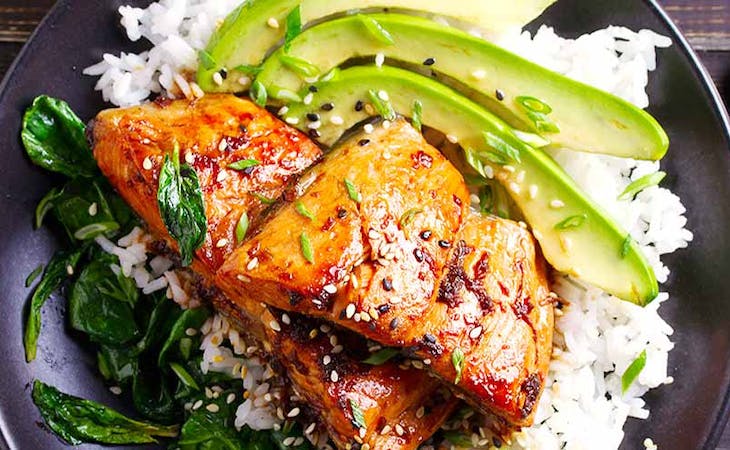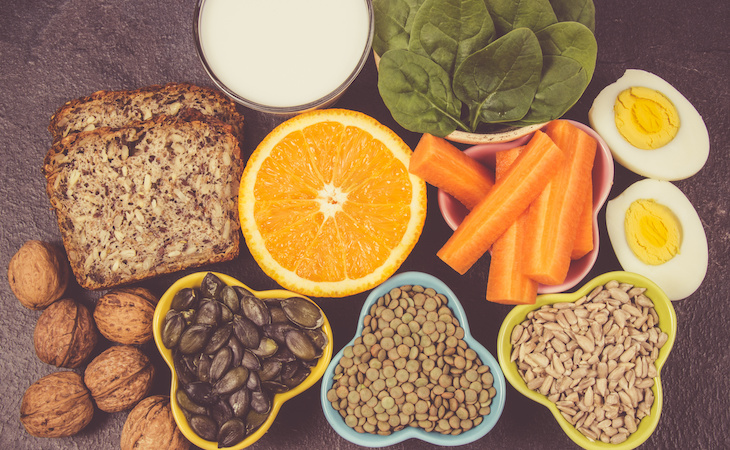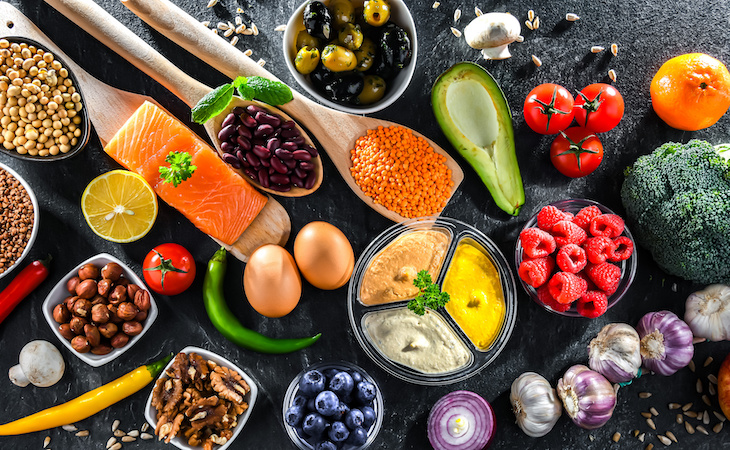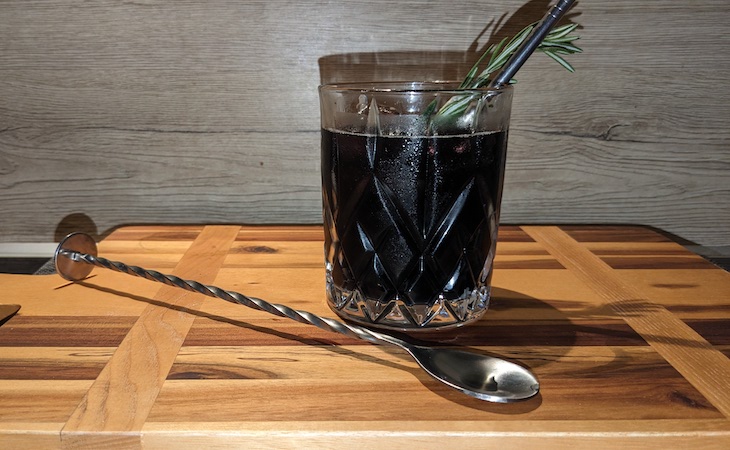Food and sleep are intimately connected. What you put in your body strongly affects how you sleep—and how well you sleep (or don’t) profoundly influences your metabolism, appetite, eating behaviors, and weight management.
Here’s why: When you don’t sleep enough, your metabolism slows down. As a result, you feel compelled to eat more and start to crave foods, like fat and sugar, that don’t give you the best bang for your caloric and nutritional buck. That can lead to weight gain. Additionally, suboptimal diets, such as those high in fat and sugar and low in fiber, are associated with sleep arousals and less restorative sleep.
No single vitamin, mineral, or macronutrient plays the definitive role in optimizing sleep; rather, many work together to contribute to your sleep quality and ultimately to your overall health. And research suggests that people who eat a large variety of foods, as an indicator of a well-balanced diet, have the healthiest sleep patterns.
So if you want to give your general health a boost, start by choosing foods that support a good night’s sleep.
Foods that help you sleep
Melatonin
Much has been written about melatonin, a hormone produced in the pineal gland that helps regulate your body clock. Melatonin production naturally increases at night, one reason it is often referred to as the “hormone of darkness.”
Melatonin is available as a supplement, but it’s also found in food. A diet that includes foods rich in melatonin can help you get a better night’s sleep without worrying about the safety or efficacy of supplements. Melatonin-containing foods provide a host of other health benefits, such as increased antioxidant and anti-inflammatory activity, cardiovascular protection, and enhanced immune function.
Sources of dietary melatonin include nuts (almonds, pistachios, walnuts); fruits and berries (cherries, grapes, raspberries, strawberries); tomatoes; peppers; and wine. (Learn more about the relationship between nutrition and sleep.)
Calcium
Calcium helps the brain produce and use the amino acid tryptophan to manufacture melatonin. Several studies have linked calcium deficiency to difficulty falling asleep. Calcium works with magnesium to relax muscles. Good natural sources of calcium are dairy (milk, cheese, yogurt); citrus fruits; dark leafy greens (collards, kale, and others); nuts; soy; and fish like sardines and salmon. (Some people report dairy gives them vivid dreams. Here are other top causes of strange dreams.)
Magnesium
Magnesium is a natural relaxant and an essential mineral for sleep function. It helps maintain healthy levels of GABA (gamma-aminobutyric acid), a neurotransmitter that promotes relaxation. Magnesium deficiency is common and linked to insomnia and restless legs syndrome.
Magnesium-rich foods include nuts and seeds (almonds, cashews, sunflower seeds, pumpkin seeds), bananas, avocados, spinach, broccoli, peas, beets, beans, and soybeans. (Here’s what you need to know about eating avocado before bed.)
Potassium
Potassium increases sleep efficiency, improves overall sleep quality, and reduces episodes of waking after sleep onset. A lack of potassium can lead to difficulty staying asleep. Potassium-rich foods include bananas, carrot juice, prune juice, lima beans, white beans, potatoes, salmon, tuna, and spinach.
Tryptophan
Tryptophan is an amino acid that helps your body make serotonin, a hormone associated with relaxation that is required to make melatonin. Tryptophan has been shown to be effective in reducing sleep onset time—perhaps the reason why it’s most commonly associated with post-Thanksgiving dinner food coma. A study in the American Journal of Clinical Nutrition indicated that participants who ate tryptophan-rich foods suffered less daytime sleepiness and enjoyed sustained alertness early in the morning, most likely due to improved nighttime sleep.
Foods rich in tryptophan include lean beef, poultry, shellfish, and other fish like tuna and halibut; eggs; pumpkin seeds and sesame seeds; soybeans, white beans, and chickpeas; cheddar cheese; chocolate; and dates.
Vitamin B6, vitamin D, and zinc
Vitamin B6, contained in many of the above foods, also helps convert tryptophan into melatonin. A B6 deficiency is linked to lowered serotonin levels and poor sleep, as well as mood disorders and depression—all of which can lead to insomnia. Additionally, Vitamin B6 supports dream recall.
Vitamin D, too, may also play a role in sleep, as might the mineral zinc. In one study it was found that zinc, along with melatonin and magnesium, improves sleep quality for those who suffer from insomnia.
The importance of a balanced diet for sleep
Although sticking to a diet low in carbohydrates, fat, or protein is largely a matter of personal preference, how we balance the basic building blocks of sustenance does make a difference in how well we sleep.
Carbohydrates
Carbohydrates, for example, increase tryptophan and serotonin production, which can contribute to daytime sleepiness. Additionally, they cause spikes of insulin, which has the same effect.
Fiber
Eating a diet rich in fiber, on the other hand, can help you achieve deeper, more restful slumber and better daytime alertness. A 2016 study published in the Journal of Clinical Sleep Medicine found that consuming foods low in fiber and high in saturated fat and sugar is associated with lighter, less restorative sleep. Consider adding artichokes, beans, chickpeas, hummus, or quinoa to your diet to improve your fiber intake.
Omega-3s
Omega-3 fatty acids are linked to sleep quality because they boost the sleep-promoting effects of melatonin. Additionally, a Journal of Sleep Research study linked omega-3 fatty acids to improved sleep in children.
Protein
Increased protein intake has been linked with less difficulty falling asleep, less difficulty maintaining sleep, and more restorative sleep. Overweight and obese adults who are losing weight with a high-protein diet are more likely to sleep better, according to research from Purdue University.
Just as there are foods that can help you sleep, there are also foods that can make getting a good night’s sleep more difficult. Here are the 10 worst foods to eat before bed.








